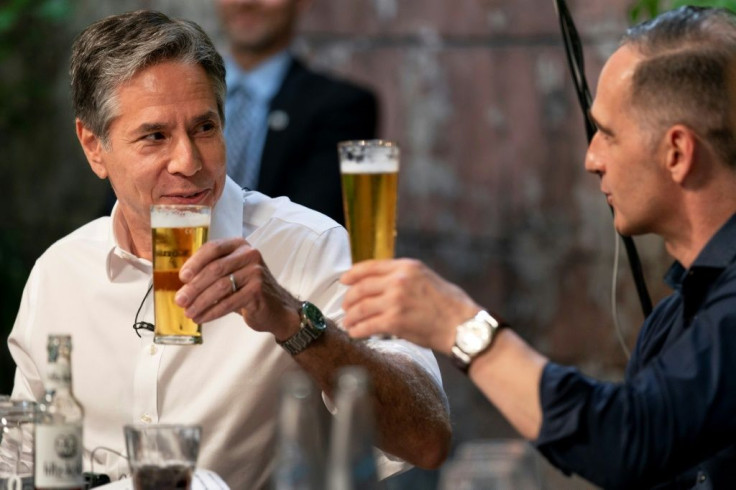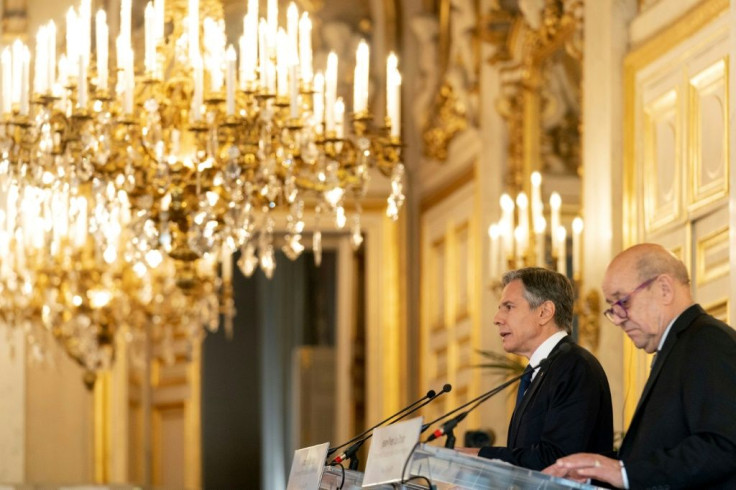In Europe, US Allies Gush Over Friendly New Administration
Germany's top diplomat could barely stop smiling as he had a beer with US Secretary of State Antony Blinken in Berlin. Not so long ago, he acknowledged bluntly, he had less fun talking to American leaders.
"I still have to get used to the fact that I can speak to the American secretary of state and always be of the same view because that used to be different," Foreign Minister Heiko Maas said, recounting his first conversations with Blinken.
If anyone was uncertain that he was referring to tensions with former president Donald Trump, he quickly made it explicit with a mordant analogy.
"We had President Trump, then we had the virus. It has made matters extremely complicated. I now hope that we will overcome the virus, too," Maas said over beers as he invited Blinken to a conversation with young Germans on Thursday at a historic ball house.
It may not all be plain sailing: the positive mood music may conceal closed-door tensions on issues ranging from China and Russia to trade. But the change in atmosphere is startling.
One day later, French Foreign Minister Jean-Yves Le Drian offered Blinken a similar message, albeit in the more formal setting of the Quai d'Orsay, the ornate foreign ministry in Paris.

Universal values and democracy "are our common foundations and far too often over the past four years France and the Europeans had to fight alone against attacks on these fronts, which are continuing," Le Drian said.
"So I'm very happy that we can work together to preserve this international order based on cooperation and the rule of law," he said.
Blinken is visiting Germany, France and Italy days after President Joe Biden's own weeklong tour of Europe, part of a concerted push by the five-month-old administration to unite a West that's faced with challenges from an increasingly assertive China as well as Russia.
Blinken, voicing one of his common themes to Maas, said it was critical for the United States to work with like-minded countries and manage disagreements.
"The natural thing is when you have the same basic values, that brings you together in cooperation, but it doesn't just happen -- you have to work at it."

Preternaturally even-tempered and fluent in French from his childhood in Paris, Blinken could hardly be more different in style than his predecessor Mike Pompeo, a blunt former congressman who advanced Trump's "America First" philosophy.
On Pompeo's sole bilateral visit to France, in November, his hosts kept public appearances to a minimum as international concern grew over Trump's unfounded claims that the election he lost was rigged.
Trump forged a number of international friendships, including with autocratic Arab leaders and former Israeli prime minister Benjamin Netanyahu.
But his relationships with European leaders, especially German Chancellor Angela Merkel, were fraught as the businessman-turned-president needled allies over what he saw as unfairly taking advantage of US security guarantees.
The differences between the two administrations go beyond atmospherics. Biden has quickly moved to resolve key disputes with the Europeans, seeing the bigger picture as defending the democratic model as China's clout grows.
The moves are not without controversy, with even some in Biden's Democratic Party uneasy that he waived key sanctions over the Nord Stream 2 gas pipeline being built from Russia to Germany.
Blinken raised some eyebrows by saying that the United States has "no better friend" than Germany -- even as he acknowledged himself divergences over the pipeline.
France and Germany have also pushed for their own dialogue with Russian President Vladimir Putin, who met in Geneva with Biden in a US bid to bring stability to tense relations.
Erik Brattberg, director of the Europe programme at the Carnegie Endowment for International Peace said that the European powers believed they needed a direct line with Russia as their security is affected -- and that Merkel is looking to her legacy as she ends her more than 15 years in power.
But he said that the transatlantic relationship is clearly "back on a strong track" after the visits by Biden and Blinken.
"Europeans are confident that the Biden administration's approach is far more collaborative in nature and that lingering differences can be pragmatically managed," he said.
© Copyright AFP {{Year}}. All rights reserved.





















